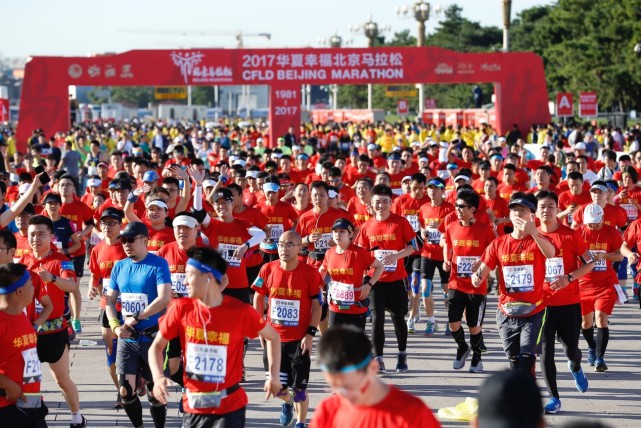For the Chinese marathon industry, paraphrasing a Charles Dickens quote “it might be the best of times but also the worst of times”.
At the 2017 Marathon Gala-China held on Jan 25, the Chinese Athletics Association (CAA) unveiled its Chinese Marathon Market Data Report for 2017. In 2017, the marathon industry in China maintained its growth momentum but has also taken further steps.
Throughout 2017, 1100 marathon races were held in China with no less than 800 runners participating in each event. Additionally 256 of these events were authorized by the CAA. As Yu Hongchen, Director of the Athletics Department of the General Administration of Sport of China (GASC), disclosed at the Gala, these 1100 events took place in 234 cities in 31 provinces including Tibet.
According to the data released the marathon industry generated a revenue of RMB 70bn, an increase of 20% from the previous year, with 2.72 million employees also working in this industry. Reportedly, in 2017, the number of companies focusing on marathon race operations and authorized by the CAA was 191. Meanwhile, over 800 companies sponsored marathon events.
Based on these figures, the authorities have expressed their expectation that the number of marathon races could surpass 1900 in 2020, with 350 of them being authorized by the CAA and over 10 million runners expected to participate in these 1900 events. The revenue from the industry in 2020 is also expected to reach RMB 120bn.
However, Wang Nan, Deputy Director of the Athletics Department of GASC, pointed out that the lack of high-quality races still remained as a big problem in the booming marathon industry in China.
Indeed included among these 1100 events, only 12 events were IAAF Label Road Races, while 44 road races were authorized as CAA Golden Label Road Races and 38 races sanctioned as CAA Silver Label Road Races. Additionally, 79 CAA Bronze Label Road Races were also unveiled at the Gala.
When we look back at the participant feedback from domestic marathon races, only a few races received widespread applause. However a lot of races were criticized by runners, with participants dissatisfied with operations and services, as well as the lack of strict qualifying entry times for marathons.
Generally, the dissatisfaction with operations and services took place in newly-launched marathon events. This is mainly because the experienced operations staff in marathon races is still very limited in China and they are inclined to join the organizing committees of races associated with a long history or a positive brand.
Fortunately, this is not a permanent or insolvable problem if practitioners in marathon race organizations are willing to gain more experience and see themselves as marathon-oriented professionals serving the participants. But unfortunately there is another urgent problem for organizing committees of marathon races in China.
Currently, we have to admit that not many marathon races in China have their own individual characteristics. For example, a great number of Chinese marathon races share similar slogans such as “the most beautiful marathon race in China” and “the race with the best service in China”. Indeed, these slogans may sound impressive for a single race but the attractiveness to take part in races will also fade away as more and more races use similar slogans.
Anyway, the two problems mentioned previously might be a result of the dramatic surge in the industry and will need time to be solved, plus the existing problems among Chinese runners.
In recent years taking part in marathon races has become fashionable, with more and more people getting the itch to join the trend, including those people who are not capable of finishing a race whether it is a full, half, 10K or 5K race. Over the years, it is not hard to read news regarding casualties in marathon races in China. Fortunately, the number of these casualties has been reduced year by year.
On the other hand, the boom in runners applying for marathon races, especially those with a great reputation, have also led to a terrible phenomenon today. In a report by the Chinese international newspaper Global Times, a marathon runner disclosed that a quota transfer has been very common in some marathon races whereby participants apply to run in an event but transfer their entry to another person possibly for a monetary gain.
Wu Mingxian, a representative of the organizing committee of the Xiamen (Haicang) International Half Marathon, also told Global Times that the organizing committee once compared more than 100,000 photos and running numbers and found 30 illegal replacements.
What is good news is that the CAA has planned a regulatory system and a marathon organizing guidebook for organizing committees, in order to improve race quality. However, runners need to be aware of their health in races and following the race rules still needs some time to be improved.
Proofread by Raymond Fitzpatrick
